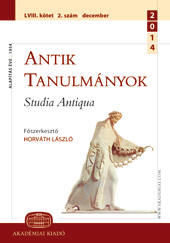„Libertae isdem coniugi T. Licinius”. Az idem névmás megkövesedésének problematikája
„Libertae isdem coniugi T. Licinius”. The Fossilization of the Pronoun "idem"
Author(s): Nóra ZelenaiSubject(s): Theoretical Linguistics, Historical Linguistics, Philology
Published by: Akadémiai Kiadó
Keywords: history of language; early imperial age; inscriptions from Rome; pronoun idem; adverb item;
Summary/Abstract: We have a large number of inscriptions, first of all from Rome, in which the masculine nominative form of the pronoun idem appears in positions where an other grammatical gender or case (usually a dative), or an adverb would be expected. The epigraphical collections generally take the idem form as an adverb, and correct it to item. However, E. H. Sturtevant suggests, that while in Ostia idem can be a local dialectal variant of item, the same form in inscriptions found in Rome should be considered as a consciously used nominative. My paper is to get a closer look on the problem of the fossilization of the pronoun idem, and on its hypothetical fusion with the adverb item by the critical evaluation of Sturtevant’s theory.
Journal: Antik Tanulmányok
- Issue Year: 60/2016
- Issue No: 2
- Page Range: 159-172
- Page Count: 14
- Language: Hungarian
- Content File-PDF

